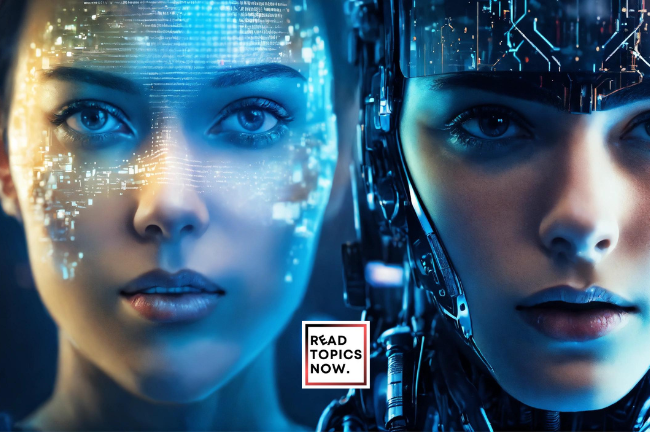
The Future Of Generative AI: Major 6 Transformations Everyone May See

Introduction
Generative AI, a technology already reshaping industries and daily life, continues to evolve rapidly. From creating text and images to assisting in complex decision-making processes, its potential seems limitless. This article explores six compelling predictions that offer a glimpse into the future of generative AI.
1. Multi-Modal Generative AIs
Definition and Scope
Multi-modal generative AI refers to systems capable of integrating multiple modes of data creation—text, images, speech, and more—simultaneously. This capability enables AI to mimic human-like multitasking and creativity.
Current Innovations in Multi-Modal Generative AIs
For instance, the latest version of Dall-E has surpassed previous iterations by integrating high-quality text directly into generated images. Similarly, OpenAI’s ChatGPT can now process text, generate responses, and even interpret visual and auditory inputs.
Future Trends in Multi-Modal Generative AIs
The trend towards real-time, multi-modal AI creation promises to revolutionize sectors such as content creation, customer service, and healthcare diagnostics. By 2025, it’s projected that 60% of businesses will integrate AI capabilities into their operations, with a significant portion utilizing multi-modal AI for enhanced customer interaction and service delivery.
2. Interactive AI
Definition and Concept
Interactive AI goes beyond traditional generative capabilities to enable real-time interaction and task delegation. This includes AI systems that can autonomously manage projects, delegate tasks to other software agents, and coordinate human-machine collaboration seamlessly.
Industry Applications of Interactive AI
In software development, for example, interactive AI could oversee entire projects—from coding and testing to coordinating with designers and marketers. This level of automation not only improves efficiency but also frees human professionals to focus on higher-level strategic tasks.
Ethical Considerations in Interactive AI
As interactive AI becomes more prevalent, concerns about transparency, accountability, and job displacement arise. However, proponents argue that proper regulation and ethical guidelines can mitigate these risks while maximizing AI’s potential for positive societal impact.
3.Generative AI-Equipped Robots
Integration Overview
The integration of generative AI into robots promises to expand their functionality beyond traditional programmed tasks. By imbuing robots with AI capabilities, industries such as manufacturing, healthcare, and hospitality can achieve higher levels of automation and efficiency.
Use Cases
In manufacturing, AI-equipped robots can streamline assembly lines and quality control processes, reducing error rates by up to 30% and increasing production output by 40%. Similarly, in hospitality, robots equipped with AI can enhance guest experiences by providing personalized service and predicting guest preferences based on historical data.
Future Implications
Looking ahead, experts predict a significant rise in AI-integrated robotics across various sectors, potentially reshaping labor markets and workforce dynamics. While concerns about job displacement persist, proponents argue that AI-enhanced robots will create new opportunities for human workers in roles requiring creativity, critical thinking, and emotional intelligence.
4. Generative AI For Social Good
Applications in Social Issues
Generative AI is increasingly being leveraged to tackle global challenges such as climate change, healthcare accessibility, and food security. For instance, Artificial Intelligence algorithms can analyze vast amounts of environmental data to optimize resource allocation and predict natural disasters with greater accuracy.
Humanitarian Applications
In healthcare, generative Artificial Intelligence assists in drug discovery and personalized medicine, potentially reducing drug development timelines by 30% and improving treatment outcomes for patients worldwide. Furthermore, AI-powered agricultural systems optimize crop yields, ensuring food security and sustainability in regions prone to environmental fluctuations.
Challenges and Solutions
Despite its potential for social good, the ethical use of generative Artificial Intelligence remains a pressing concern. Ensuring AI algorithms prioritize safety, fairness, and transparency is essential to prevent unintended consequences and promote public trust in AI technologies. What Elon Musk, Mark Zukerberg has to say on AGI.
5. Generative AI Regulation And Oversight
Current Initiatives
Tech giants like Meta are implementing policies to regulate AI-generated content on their platforms, aiming to mitigate misinformation and ensure user safety. Furthermore, global efforts are underway to establish comprehensive regulatory frameworks that govern the ethical development and deployment of AI technologies.
Need for Ethics
Ethical considerations surrounding generative AI encompass issues such as bias mitigation, data privacy, and algorithmic transparency. By integrating ethical guidelines into Artificial Intelligence development processes, stakeholders can safeguard against misuse and promote responsible AI innovation.
Future Directions of Gen AI
Looking forward, the establishment of robust Artificial Intelligence regulations will be critical in harnessing its full potential while mitigating risks. By fostering collaboration between policymakers, industry leaders, and ethicists, society can collectively navigate the complexities of AI governance and ensure its benefits are equitably distributed.
6. AI Delegation And Work Enhancement
Workforce Impact
Generative AI’s ability to automate routine tasks and enhance decision-making processes is poised to transform global labor markets. While some jobs may be at risk of automation, the majority are expected to evolve as AI augments human capabilities rather than replacing them entirely.
Productivity Gains
Studies indicate that AI-driven automation could increase global productivity by up to 25% by 2030, unlocking new economic opportunities and job creation in emerging AI-centric industries. By automating repetitive tasks, generative AI allows workers to focus on innovation, problem-solving, and cultivating interpersonal relationships.
Future Work Trends
The future of work will likely emphasize human-machine collaboration, where AI complements human expertise in areas such as creativity, complex decision-making, and adaptive learning. As Artificial Intelligence continues to evolve, developing skills in AI delegation and ethical AI usage will become increasingly valuable for future generations of workers.
Conclusion
Generative AI stands at the forefront of technological innovation, offering transformative possibilities across industries and societal sectors. By embracing ethical guidelines, fostering regulatory oversight, and promoting collaborative AI development, humanity can harness AI’s potential to create a more equitable and sustainable future.
FAQs About the Future of Generative AI
What is generative AI?
Generative AI refers to technology that can autonomously create content such as text, images, or even music without direct human input. It uses algorithms to analyze and mimic patterns from existing data to generate new content.
How is multi-modal generative AI different from traditional AI?
Multi-modal generative AI integrates multiple forms of data creation, such as text, images, and speech, simultaneously. This allows AI systems to perform complex tasks that involve multiple modalities, mimicking human-like multitasking abilities.
What are some current examples of multi-modal generative AI?
An example is Dall-E, which can generate images from textual descriptions and now integrates text directly into images. Another example is ChatGPT, which not only processes text but also interprets visual and auditory inputs, enhancing its conversational capabilities.
How will interactive AI change industries?
Interactive AI enables real-time interaction and task delegation, allowing AI systems to manage projects autonomously and coordinate with other software and humans. This capability is expected to streamline processes in industries like software development and customer service.
What are the ethical considerations of using generative AI?
Ethical concerns include issues of bias in AI algorithms, privacy concerns with data usage, and the potential impact on job markets due to automation. It’s crucial to develop ethical guidelines and regulatory frameworks to ensure AI is used responsibly and for societal benefit.
How can generative AI benefit society?
Generative AI has applications in addressing global challenges such as climate change, healthcare accessibility, and food security. It can optimize resource allocation, accelerate drug discovery, and enhance agricultural productivity, contributing to a more sustainable and equitable world.
What are the future trends in AI delegation and workforce enhancement?
The future of work will likely involve AI automating routine tasks, allowing humans to focus on higher-level cognitive tasks like problem-solving and creativity. Developing skills in AI delegation and understanding AI ethics will be crucial for future workforce readiness.
How can regulatory oversight ensure responsible AI development?
Regulations are essential to ensure AI technologies are developed and deployed ethically, safeguarding against misuse and promoting transparency. Initiatives by tech companies and global regulatory bodies aim to establish guidelines that prioritize safety, fairness, and accountability in AI use.
What are the predicted impacts of AI-integrated robotics?
AI-integrated robotics are expected to revolutionize industries like manufacturing and hospitality by enhancing automation and operational efficiency. While concerns about job displacement exist, proponents argue that AI will create new job opportunities in AI-centric roles.
How can businesses prepare for the adoption of generative AI?
Businesses can prepare by investing in AI training and education for employees, developing AI strategies aligned with ethical guidelines, and staying informed about regulatory developments. Collaborating with AI developers and integrating AI into strategic planning can also ensure successful AI adoption.
Get Curated Post Updates!
Sign up for my newsletter to see new photos, tips, and blog posts.

I blend engineering prowess with MBA insights, embracing life with perspective and imagination. My mantra? ‘Get busy living or get busy dying.’ Fascinated by tech, geopolitics, AI, sports, cinema, and jazz.





